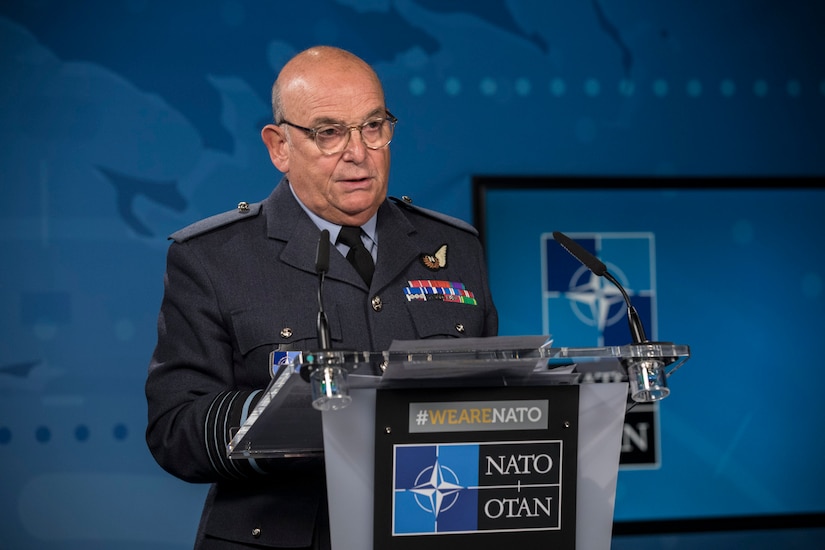May 15, 2020 | BY Jim Garamone , DOD News
While these are challenging times, NATO nations do not face
these problems alone, the chairman of NATO's Military Committee said today.
Royal Air Force Air Chief Marshal Sir Stuart Peach held a
virtual briefing for the news media on the results of the NATO Chiefs of
Defense meeting. The meeting – also virtual – brought together the 30 military
leaders of the alliance. They discussed the response to coronavirus and other
threats to the NATO nations.
The recommendations that stem from the meeting will be used
to inform next month's defense ministerial, he said. Army Gen. Mark A. Milley,
the chairman of the Joint Chiefs of Staff, participated in the NATO meeting
from his Pentagon office.
''NATO allies and partners are standing together and acting
together in solidarity,'' Peach said. ''Together, we endure, persevere and
overcome.''
NATO must be on guard to ensure that nations or groups do
not try to exploit the pandemic for their own gains, he said.
''We have seen an increase in disinformation aimed at sowing
division in the alliance and in Europe as well as undermining our
democracies,'' the air chief marshal said. ''We have seen a continued pace of
Russian military activity. Over the last couple of weeks, the NATO Baltic Air
Policing Mission has been deployed numerous times to intercept Russian
aircraft.''
The attacks in Kabul brought Afghanistan into focus, and the
chiefs discussed the security situation in that troubled country. Peach said
there has been some progress in inter-Afghan negotiations.
''In Iraq, the situation remains unstable,'' he said. ''The
fight against [the Islamic State of Iraq and Syria] is not over. Coalition
forces are working hard to safeguard the progress and gains achieved.''
NATO allies and partners are standing together and acting
together in solidarity.''
Royal Air Force Air Chief Marshal Sir Stuart Peach,
chairman, NATO Military Committee
NATO forces remain in Iraq to ensure peace and stability.
''Our forces remain ready, and our work continues,'' Peach said.
All the chiefs reiterated their commitment to the alliance.
''They assured that COVID-19 would not affect their contributions to collective
defense, including our multinational battlegroups in the east of the alliance, NATO
air policing, our maritime deployments and our missions from Afghanistan to
Kosovo,'' Peach said.
NATO personnel will adapt special measures to protect
themselves from infection, but the missions are too important to let slide, he
said. ''Our ability to deter and, if necessary, defend persists,'' he said.
The peacekeeping mission in Kosovo continues with 19 NATO
allies and eight partner nations contributing roughly 3,500 troops. ''KFOR
provides a safe and secure environment for all people and communities and is an
important contributor to the stability of the Western Balkans,'' Peach said.
The Resolute Support Mission in Afghanistan continues, and
NATO personnel continue to train, assist and advise Afghan partners. ''We will
continue to adapt our presence in Afghanistan through a conditions-based
process, in close coordination with all allies and, importantly, our
partners,'' Peach said.
Following clear political direction from NATO ministers in
April, the chiefs of defense discussed new ways to contribute more to the
security in the Middle East and North Africa Region to complement existing
efforts, the chairman said.
The chiefs also worked to make operational NATO's military
strategy, which was approved last year. ''This work is being refined and made
operational through our work on the Concept for Deterrence and Defense of the
Euro-Atlantic Area, supplemented and complemented by the NATO Warfighting
Capstone Concept, which looks forward 20 years and sets a vision to support
allies' efforts to develop military forces,'' Peach said.
The results will also go before the Defense Ministerial next
month. ''These concepts will improve the future alignment of existing
mechanisms, processes and activities as well as the procurements requirements
resulting from our continuous process of adaptation,'' he said. ''It brings
coherence to all our military activities.''
The chiefs, along with Italian army Gen. Claudio Graziano,
chairman of the European Union Military Committee, also discussed NATO's
response to COVID-19.
NATO has launched more than 150 missions to support and
transport medical personnel, supplies and treatment capabilities. The alliance
has facilitated the construction of more than 50 field hospitals and alternate
care facilities. There have been numerous international aero-medical
evacuations with critical care teams; and more than 3,500 allied citizens from
around the world have been repatriated, Peach said.
''We concluded the meeting after an in-depth discussion
about the effects of this pandemic and a discussion on resilience and the
importance to capture lessons that can be implemented to better prepare for any
future health crisis,'' he said.

No comments:
Post a Comment